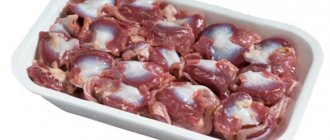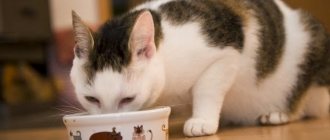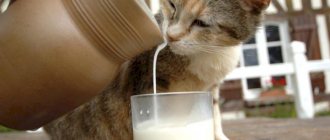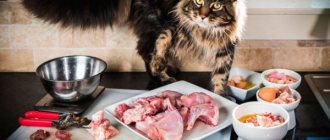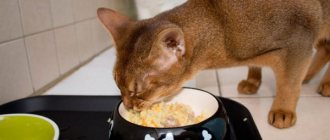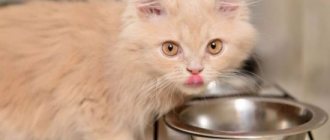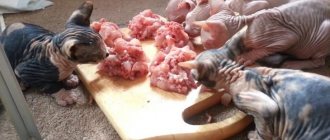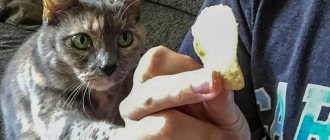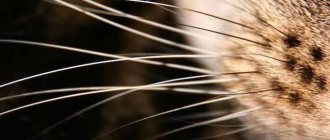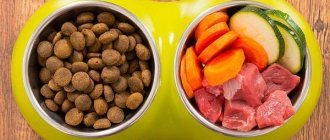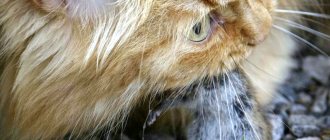You enjoy a delicious dinner that includes potatoes (whether mashed, fried, or otherwise). Suddenly, a piece of it accidentally falls on the floor, and the furry friend sitting next to him decides to immediately try what was on the owner’s plate. Of course, you think, why not allow your beloved cat to eat a delicious slice, because potatoes are absolutely safe for the health of animals. Or is this not entirely true?
The answer to the question depends on the type of potato. When it comes to the safe consumption of this vegetable by a cat, not only its variety is important, but also the method of preparation.
What about "sweet potatoes"?
According to the American Society for the Prevention of Cruelty to Animals, sweet potatoes are not toxic to animals. This may be true, but this does not mean that you should start feeding your beloved pet it all the time. As with regular potatoes and any other human food, you should be careful when trying to treat a new product to your furry friend.
The digestive process in cats is different from that of humans. Sweet potatoes can irritate the stomach of animals. Also, for felines, “sweet potatoes” do not have the same nutritional value as they do for humans. A small portion of boiled, softened sweet potato can be considered an occasional treat, but it is necessary to observe the cat's reaction after eating a new treat.
Benefits and harms
Thanks to this root vegetable, pets' skin lesions heal better.
Adding potatoes to a kitten's diet has both positive and negative sides. The advantages of such nutrition include the fact that the vitamins contained in the vegetable have the following effects on the body:
- improve visual functions;
- make the coat thick;
- improve immunity and nervous system;
- normalize metabolism;
- accelerate wound healing.
Useful substances such as copper and potassium are necessary for building bone tissue and muscles and maintaining the functioning of the heart. Fiber is an essential component for normal digestion. During diarrhea, it removes fluid and helps remove hairballs that form in the gastrointestinal tract of cats. The benefits of potatoes are also evidenced by the fact that many feeds contain this product. The downside of kittens eating root vegetables is the high starch content in the product. This component clogs the intestines, is very poorly digested or not digested at all, which leads to indigestion and flatulence.
Is pasta harmful or healthy?
By nature, cats are predators. They prefer meat as their main food. In the wild, cats will not refuse to feast on small rodents and birds, which, in turn, feed on plant grains. Thus, the contents of the stomach of its victim also enter the cat’s stomach, that is, plant food, which is completely absorbed by the cat’s body. From this we can conclude that there is nothing wrong with a cat eating a little pasta.
What is pasta, and what beneficial substances will your pet get from this food? It is widely believed that the product is very high in calories, and this is undesirable not only for people, but also for pets, especially those couch potatoes whose physical activity consists of moving along the “kitchen-bed” route.
However, pasta contains a lot of useful substances. Carbohydrates, which are rich in flour products made from durum wheat, are a source of energy. And although the diet of a domestic cat should largely consist of proteins, it also needs carbohydrates. Moreover, pasta contains so-called “long” carbohydrates, which, unlike short ones, do not provide a quick burst of energy, but saturate well and provide a long-term supply of energy.
In addition, pasta contains:
- vitamins of group B, E, PP;
- minerals – magnesium, iron, potassium, phosphorus, calcium;
- fiber, which improves digestion and promotes the removal of toxins and heavy metal salts from the body.
Pasta contains a small amount of vegetable protein, which, although digested worse than animal protein, is nevertheless beneficial for the body. There is very little fat in pasta, so such food cannot be called harmful, although it cannot be made the basis of a pet’s diet.
Important!
It is not the pasta itself that is harmful, but the additives to it - butter, sauces, gravy. The cat definitely doesn’t need them!
How to properly include potatoes in your cat's diet
Potatoes replace grains in a cat's diet; their content should not exceed 10%. The daily dose of food for an animal is 5% of its body weight: for a cat weighing 4 kg – 200 grams, of which – no more than 20 grams of potatoes.
You should not feed your cat potatoes too often. The norm is 1–2 teaspoons (about a quarter of a boiled tuber) once a week. It is recommended to follow the rules:
- It is allowed to give the animal only boiled or baked potatoes without salt and seasonings. Salt causes urolithiasis; potatoes are mashed and mixed with meat;
- Young potatoes containing little starch are preferable;
- Before cooking, old tubers should be thoroughly cleaned, washed, if you have time, cut into pieces and soak in cold water for at least an hour;
- Do not use green or sprouted tubers: solanine is poison for animals;
- You cannot feed your cat raw and fried potatoes;
- Do not mix potatoes with prepared food: both dry and wet. Ready-made food already contains the optimal amount of products a cat needs. By adding natural food to them, the owner upsets the balance. The simultaneous intake of prepared feed and natural products leads to dehydration of the animal's body.
If a cat eats potatoes for the first time, you need to take a closer look to see if your pet develops bloating, flatulence, constipation or diarrhea. In case of a negative reaction, the root vegetable should be completely excluded from the diet. It is not recommended to add crushed dried potatoes or potato flour to animal food: it is very difficult to calculate the required dose. In addition, these products often contain preservatives.
Cats can only be given boiled potatoes without seasonings, salt and spices, no more than 20 grams per day
Sometimes cats show increased interest in potatoes: they beg their owner for a crispy piece or start gnawing on raw tubers. Perhaps the animal lacks potassium, silicon, vitamins C or E. In order not to harm the health of the pet, it is better not to indulge its tastes. In such cases, it makes sense to consult a veterinarian and introduce appropriate vitamins into the cat’s diet.
mother, housewife and cook at heart
Reasons for this behavior
The etiology of this condition has not been fully studied, but it is safe to say that by eating soil, cats do not intend to misbehave or upset their owners, so there is no point in punishing them for this.
Analyzing the health status of pets with this bad habit, experienced veterinarians came to the conclusion that, in most cases, pica in cats is evidence of medical abnormalities. It can be:
- psychological disorders;
- infection with certain types of parasites;
- lack of certain vitamins and microelements in the body;
- the need to cleanse the gastrointestinal tract.
If a cat eats dirt, this may indicate that he is stressed or depressed. Any stressful situation can lead to changes in behavior. Cats react to stress differently. The characteristics of the breed and character are of great importance. If an animal has never suffered from lack of attention and affection and has always received good nutrition, then it will be better able to cope with the negative consequences of unpleasant situations. This cannot be said about those animals whose fate was not so successful.
This type of pica can develop in a cat that has experienced a strong feeling of hunger in extreme conditions (for example, if, as a kitten, it almost died of starvation after getting lost on the street).
Stress and depression in cats can also be triggered by the following situations:
moving to a new apartment, change of owner; sitting alone for long periods of time; the appearance of new people in the house or competition with another cat; uncomfortable living conditions; unsatisfied need to communicate with the owner; insufficient attention to it.
To eliminate behavioral problems, it is necessary to eliminate the unfavorable factors that caused stress or depression
To do this, you should provide your pet with increased care and attention and eliminate the lack of communication. In severe cases, you will have to give him sedatives and antidepressants prescribed by a veterinarian
We invite you to read: Ketosteril for cats: instructions for use, indications and side effects
A cat's greedy eating of soil may indicate infection with worms. In nature, animals often swallow sand in order to rid themselves of internal parasites. The domestic cat, following the same instinct, often eats soil from a flower pot or cat litter.
Therefore, the animal should be urgently dewormed using broad-spectrum antihelminthic drugs if the following signs of a cat being infected with worms are present:
- weight loss;
- dull, tousled fur;
- bloated stomach;
- frequent vomiting;
- weeping, festering eyes;
- unpleasant odor from the mouth.
These are potassium and calcium, sodium and phosphorus. If this is the reason, then you need to balance the cat’s diet by adding ash to the food - a source of magnesium and related microelements. It is believed that a cat that eats a lot of meat may experience a lack of minerals. It can remove calcium from the body, which creates a risk of developing osteoporosis and rickets.
It is not recommended to give your animal synthetic vitamins and microelements on your own. A veterinarian must make the necessary appointments.
To enrich the cat's diet with vitamins and herbs, you can plant peas, oats, wheat, barley, and rapeseed in a shallow container for the cat.
Iron deficiency anemia can also be a cause of food perversions. This disease occurs especially often in kittens during their active growth period. The disease can be recognized by the pallor of the mucous membranes, bradycardia, and general lethargy. The diagnosis is confirmed by the result of a blood test for iron content. To treat severe anemia, special injectable drugs (Ferrum Lek and Erythrostim) may be needed.
The cat must periodically clean its stomach of hair that gets there after licking. She usually uses grass for this purpose. There is a version that at home a cat's stomach brush is soil from flower pots. It is recommended to specially grow grass at home for the cat, which he could use for this purpose. You can also give her a special paste to remove swallowed fur from the gastrointestinal tract.
Feeding kittens with ready-made formulas
If you decide to feed your baby with specialized formulas, it is important to adhere to the following recommendations:
- It must be remembered that the basis of a kitten’s diet should still be soft, canned food. Dry food can be used 1-2 times a day;
- The use of additional additives with this diet is not necessary; specialized animal feed already contains all the necessary vitamins;
- During the demi-season, it is important to feed the kitten with fresh grass. Wheat or oat seeds for cats can be purchased at a pet store.
When feeding kittens with dry food and canned food, it is also important to carefully monitor portion sizes and not overfeed the animal.
Whatever feeding method you choose is best for your ward, it is important to always follow a few simple rules:
- Do not offer your kitten sweet food, sugar is very harmful to its health;
- Do not allow him to steal food from the master's table; the digestive system of cats is very different from the human one, and some foods from the master's table can seriously harm him;
- Carefully monitor the portion sizes for the animal and the cleanliness of its dishes;
- Maintain the kitten's drinking regime.
By following the recommendations outlined above, you can easily feed a kitten, getting a healthy, grateful and cheerful friend. And your days together will be filled only with positive emotions. And the cat Behemoth, walking around the house with a pickled mushroom pinned on a fork, was invented by the writer M. Bulgakov. Cats do not eat pickled mushrooms. It's harmful to them. And it tastes disgusting, according to a cat.
Can it be given to cats?
Raw potatoes
The peelings, like the raw root vegetable itself, are toxic to your pet.
If a kitten steals and chews the peelings of a tuber, then you should contact a specialist and try to wean him off this delicacy. Most veterinarians prohibit giving raw potatoes to your pets. The reason is solanine contained in the vegetable, which is considered quite poisonous. Such feeding can cause not only harm to the kitten in the form of poisoning, but also lead to death. Another reason is the high starch content, which makes it difficult for the digestive system to function. Therefore, cats should not eat raw potatoes.
Boiled potatoes
The prepared root vegetable is completely safe for pets. During heat treatment, solanine is completely destroyed. When introducing potatoes into an animal’s menu, you should follow some rules:
- You should only give your kitten boiled or baked potatoes.
- It is better to take new potatoes with a low starch content.
- You cannot cook sprouted tubers.
- The old vegetable should be thoroughly cleaned and soaked in cold water.
- You need to cook without salt and other spices.
The amount of starch in boiled or baked vegetables is within the acceptable limit, so it will not harm the cat. However, it is important to ensure that bloating, constipation or diarrhea does not occur.
Veterinarians often do not recommend feeding your pet potatoes. The acceptable norm is ¼ of an average root vegetable once a week. Kittens eat mashed potatoes with great pleasure. It can be mixed with meat or fish, 1-2 tsp. weekly. The restriction on the amount of root vegetables consumed is due to the large amount of carbohydrates it contains. It is known that such abuse can lead to obesity in a cat. It is also not recommended to frequently feed your animal lentils and other legumes.
Vegetables as a source of dietary fiber
- Fiber is necessary for the intestines to function properly. However, the deserted (= sparsely populated) digestive tract can process it due to its special structure. However, in terms of usefulness in the literal sense of the word, it’s not worth considering dietary fiber from this side. But fiber is needed as a brush to cleanse the intestines and speed up digestion. Sympathy forms feces and reduces the risk of congestion.
- Meanwhile, other valuable substances contained in vegetables are absorbed and must be absorbed into the body. This is especially true for those crops that the adopted child consumes with pleasure. If the cat is overweight, pickles will only be a plus. They create a feeling of fullness, are low in calories and make stool liquid.
- Veterinarians specializing in dietology and nutrition for cats claim that in the presence of excess weight, vegetables are introduced into the animal’s menu in the amount of 15% of the daily menu. However, at the same time, it is necessary to equip the cat with sufficient meat. It is important to know the norm and introduce vegetables close to the animal first in small portions. Abrupt introduction of such products into the catalog will lead to diarrhea, vomiting, and fecal incontinence.
Selection of dry food
Many owners prefer to feed their pets not natural, but ready-made dry food. Experts say that such products make it possible to maintain the required balance of energy and mineral substances needed by the body. Often people choose these types of feeds because they are profitable and significantly simplify the process of feeding animals, because there is no need to prepare different dishes in advance - they are already ready. In addition, dry food does not spoil, so you do not have to constantly monitor that such food does not start to give off an unpleasant odor.
When choosing industrial dry food, sold in many stores, it is recommended to give preference to options from well-known manufacturers that produce premium or super-premium treats.
If you feed your cat dry food, then you definitely need to make sure that there is always clean water in the bowl next to the food. It is necessary to follow this rule, since most modern dry food contains no more than 12% moisture. If the indicators were different, then such food would not be stored for so long - dangerous mold would soon appear on it.
What to do with cats who love vegetables?
On the Internet you can find a large number of videos in which cats eat, and with pleasure, raw potatoes, cabbage, olives and other vegetables and fruits that are not suitable for them, and even in large quantities.
It is difficult to say what exactly is the reason for this behavior. Perhaps in an instinctively felt need, and perhaps in taste preferences. By the way, a cat tastes food about 18 times weaker than a human. And this despite the fact that cats have a very acute sense of smell.
The reason lies in the smaller number of taste buds, as well as in the method of feeding: a cat’s teeth are not intended for thoroughly chewing food; their main purpose is to tear off pieces of meat from game and immediately swallow them.
According to experts, a cat often bites cucumbers or raw potatoes because it feels discomfort in the oral cavity and thus tries to “massage” the gums or cope with tartar. Owners of pets with similar predilections should pay attention to this.
All cat owners who suddenly exhibit strange food preferences should carefully analyze their pet’s diet. Predilection for plant foods is not organically characteristic of predators and may be a sign of deviations in the state of their body.
In the wild, they eat the stomach and intestines of their herbivorous prey, which contain the necessary plant components in exactly the small quantities in which cats need them.
